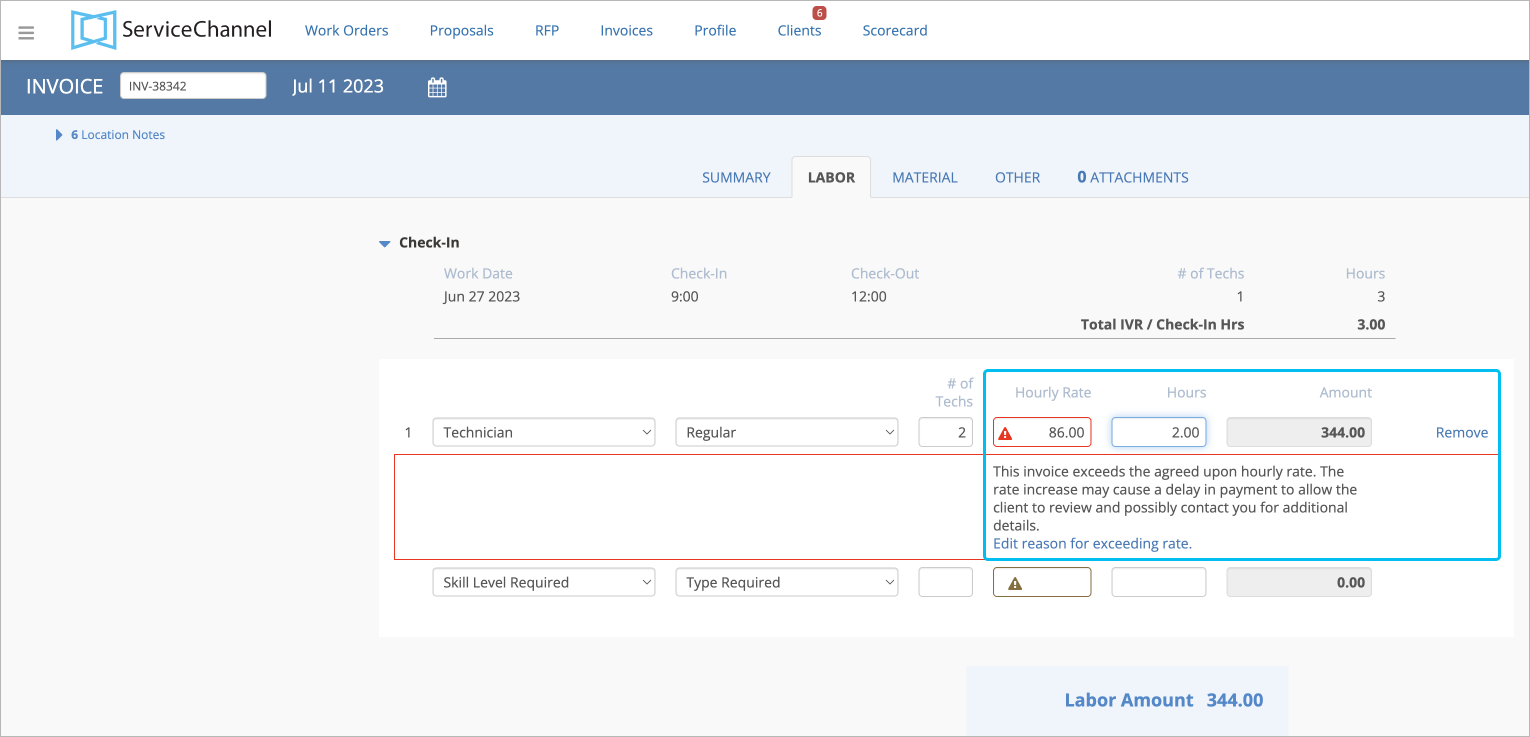A work order may be invoiced once it is in either the Completed or Completed/Confirmed status. An invoice cannot be submitted for more than its not-to-exceed (NTE) amount.
The Create Invoice button is available for any work order that is ready to be invoiced and is located on the bottom of the Work Order.
You can create an invoice in the system or through the line item invoice template.

When you have Completed work orders that you have not yet invoiced, you may get notified about it via email.
| Expand |
|---|
| title | Click here to learn more about the email notification. |
|---|
|
In the email notification, you can see the following details: - Notes on submitting invoices and other important information to consider
- Total number of Completed but not invoiced work orders submitted by the specified client
- Among not invoiced work orders for the client, the longest time in days since the request was completed
- Number of locations for which these work orders were created
- Tracking numbers of work orders
- Number of days since each service request was moved to the Completed status
Click View Work Orders in the email to navigate to the Work Orders List where you can create invoices. 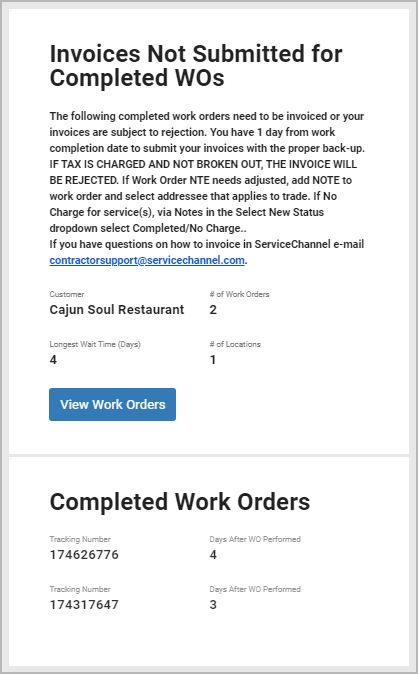
|
Invoice Requirements and Considerations
A few things to consider:
| HTML Comment |
|---|
|
LOCALIZABLE PART STARTS HERE |
- Depending on your client's requirements, you may create either a Standard Invoice or a Line Item Invoice.
- When creating an invoice, you must enter a unique invoice number; your client may also require you to enter a description of the completed work. You are not able to save the invoice without this information.
- Once an invoice is submitted, it cannot be edited. Should you need to reissue an invoice, you must void the invoice before the client takes action on it. Otherwise, you will need to reach out to your client and ask to reject the wrong invoice.
- Invoices rejected by the client cannot be edited. You must create a new invoice using another unique number — you cannot use the same number that was used for the rejected Invoice.
| HTML Comment |
|---|
|
LOCALIZABLE PART ENDS HERE |
Creating a Standard Invoice
A Standard Invoice reflects labor, travel, material, and freight charges. It does not, however, break down labor and material costs.
| HTML Comment |
|---|
|
LOCALIZABLE PART STARTS HERE |
| Panel |
|---|
| bgColor | #F9F9F9 |
|---|
| titleColor | #0e3367 |
|---|
| titleBGColor | #EAEAEA |
|---|
| borderStyle | none |
|---|
| title | ⦿ How to Create a Standard Invoice |
|---|
|
- On the desired work order, click Create Invoice.
- Enter a unique Invoice Number.
(Optional) Click the calendar icon to change the invoice date. | Note |
|---|
The invoice date cannot be earlier than the work order completed date. |
Click Confirm. | Note |
|---|
To edit the invoice number or date, click the required field in the upper left corner of the Invoice page. |
- Select the correct remit-to address.
- Enter a complete Description for the work done.
- Enter the amounts for Labor, Travel, Material, and Freight, if necessary.
- Select a category from the Other drop-down menu and enter the amount, if necessary.
- Enter the Tax, either the percentage or the monetary amount, if applicable.
 - Click Send Invoice. The invoice is created, and the Invoices List appears.
|
| HTML Comment |
|---|
|
LOCALIZABLE PART ENDS HERE |
| Anchor |
|---|
| creatinglineiteminvoice |
|---|
| creatinglineiteminvoice |
|---|
|
Creating a Line Item Invoice
When your client asks you to submit a line item invoice, it means that you need to break down invoice charges into line items.
Based on your client’s system configuration, you may be asked to break down only one, two, or all types of charges — labor, material, travel, freight and other costs. Also, your client decides whether you should itemize invoice costs for all work orders or only for work orders of specific trades and categories.
To quickly figure out what charges you should itemize, check the Summary tab on the page for creating an invoice. If you see a link by the charge name, you should itemize this type of costs. If it is a text field, enter the total amount without breaking down the costs.
| Section |
|---|
| Column |
|---|
| 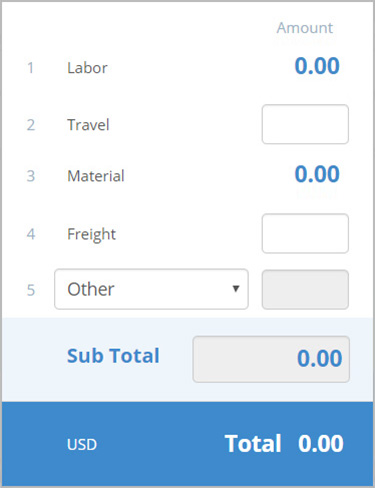
Line items are required for labor and material charges |
| Column |
|---|
| 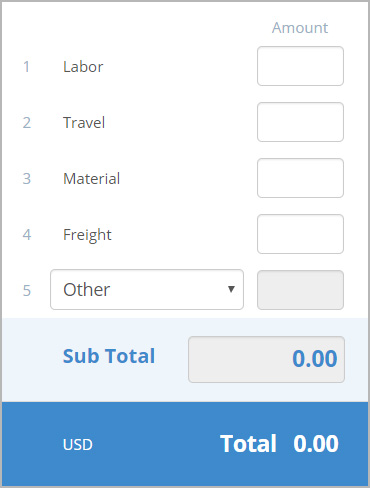
Line items are not required for any charges |
|
| Panel |
|---|
| bgColor | #F9F9F9 |
|---|
| titleColor | #0e3367 |
|---|
| titleBGColor | #EAEAEA |
|---|
| borderStyle | none |
|---|
| title | ⦿ How to Create a Line Item Invoice |
|---|
|
On the Work Orders List, find the desired work order, and click Create Invoice. The page for creating an invoice appears with the Create Invoice overlay opened. In the overlay, enter a unique invoice number, change the invoice date if required, and click Confirm. The page for providing further invoice details is displayed. 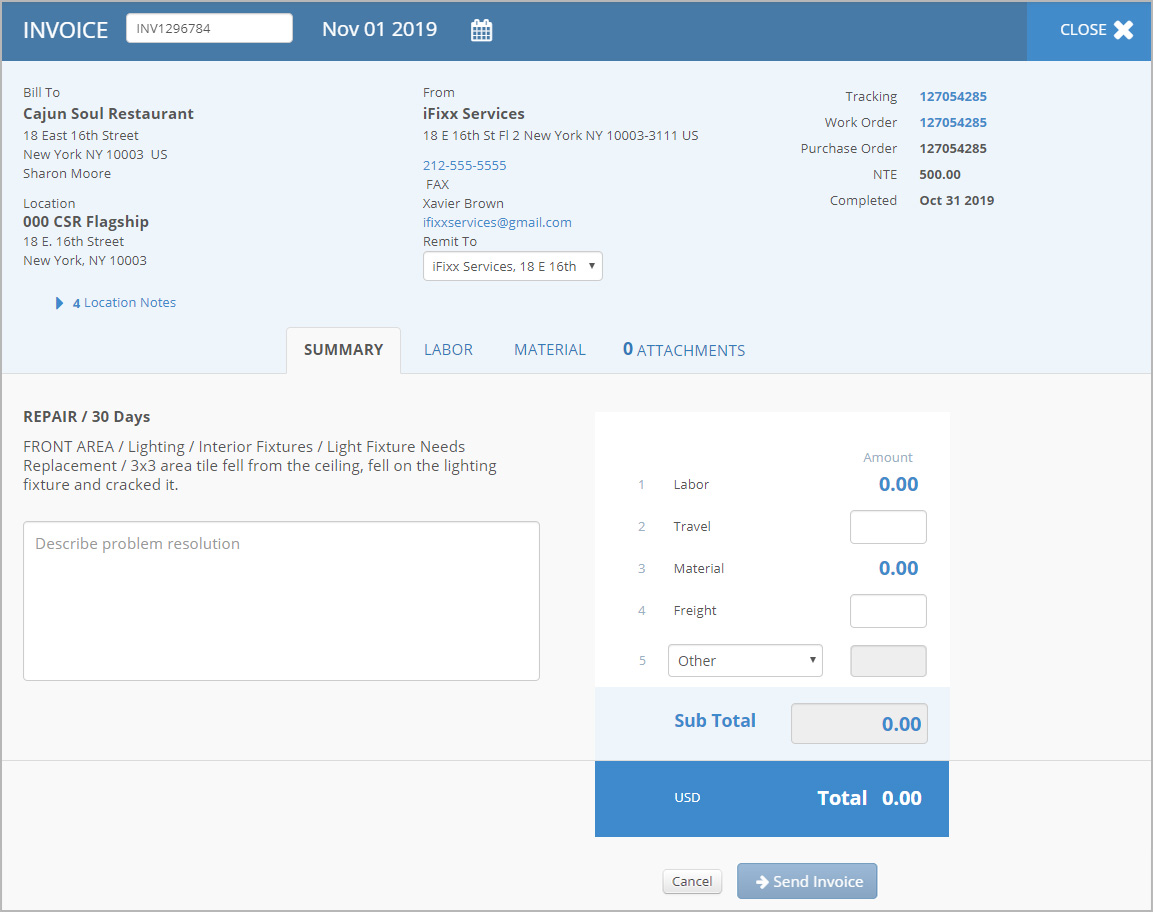
| Note |
|---|
You can change the invoice number and date in the top left corner of the page for creating an invoice. Keep in mind that the invoice date cannot be earlier than the completed date of the work order. |
- (Optional) Select another remit-to address under the column with your company info.
- On the Summary tab, provide the following details:
- Complete description of the performed work
- Total amount of labor, travel, material, freight, and other charges if you see a text field by their name
Depending on your client’s requirements, itemize labor, material, travel, freight, or other charges. The costs you need to break down appear as links on the Summary tab. Navigate between the tabs below to check how to break down each type of costs.
| Rw ui tabs macro |
|---|
To break down labor charges: - Navigate to the Labor tab.
- Enter the following information on the employees who performed the job:
- Repeat the previous step to add another line item.
 Image Modified Image Modified
To itemize material charges: - Open the Material tab.
- Provide the following details on the material used to complete the work order:
Part Name
| Tip |
|---|
If you use negotiated price lists with your client, you can select parts from the drop-down list. The price per item will be auto populated. If you change it to a higher or lower price, you will see the Warning  icon and may be prompted to enter the reason for the price mismatch. The negotiated price list specifies prices for material and other charges, and markup %. icon and may be prompted to enter the reason for the price mismatch. The negotiated price list specifies prices for material and other charges, and markup %. 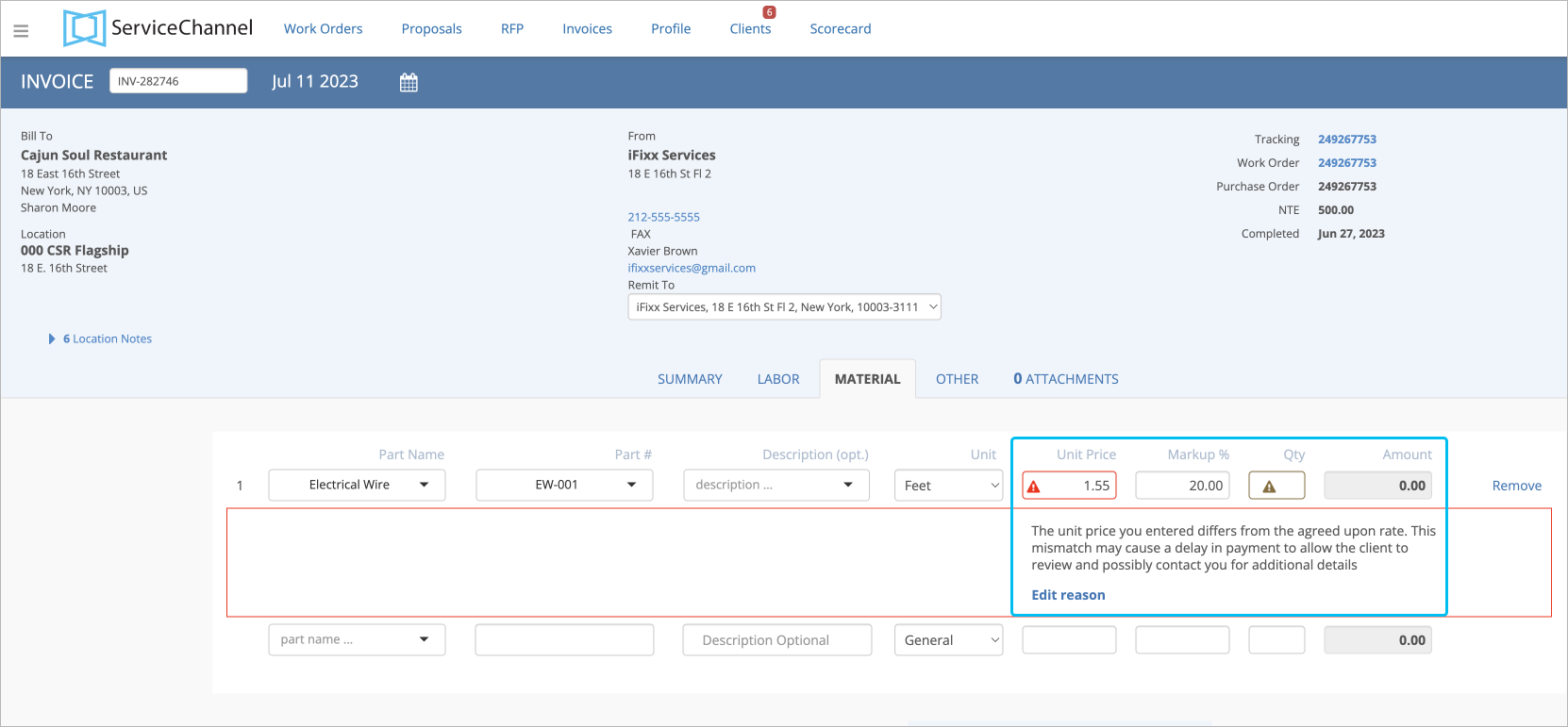
We recommend using price lists to save time your and your clients’ time on invoice completion and price mismatch discussions. Contact your ServiceChannel manager to enable price lists. |
- Description
- Part number
Unit of Measure | Note |
|---|
Should you need the template to have international currencies, date formats, and metrics, international units of measure, contact your ServiceChannel representative. |
- Unit price
Markup %
| Note |
|---|
The markup % can be verified if it matches the agreed rate from the negotiated price list or client rates. For more information, read .
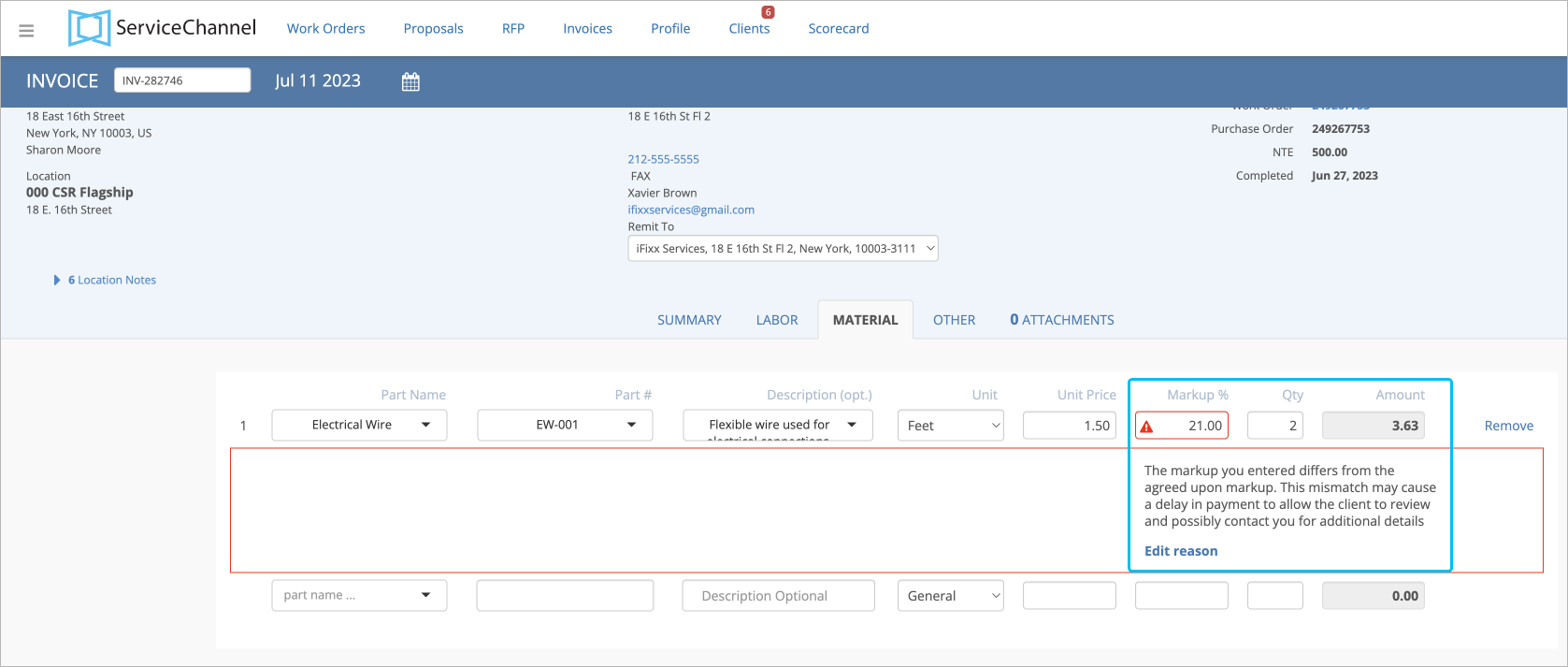
|
- Quantity
- Repeat the previous step to add another line item.
 Image Modified Image Modified
To break down other charges: - Switch to the Other tab.
- Provide the following details on the other charge:
- Comment describing the charge
- Type
- Unit
- Unit Price
Quantity
| Tip |
|---|
Type, Unit, Unit Price, and Quantity fields are available if you use negotiated price lists. They specify agreed prices for material, other charges, and markup % between you and your clients. You can select types of charges from the drop-down list, for example, permit fee or after-hours surcharge. The price per item will be auto populated. If you change it to a higher or lower price, you will see the Warning  icon and may be prompted to enter the reason for the price mismatch. icon and may be prompted to enter the reason for the price mismatch. 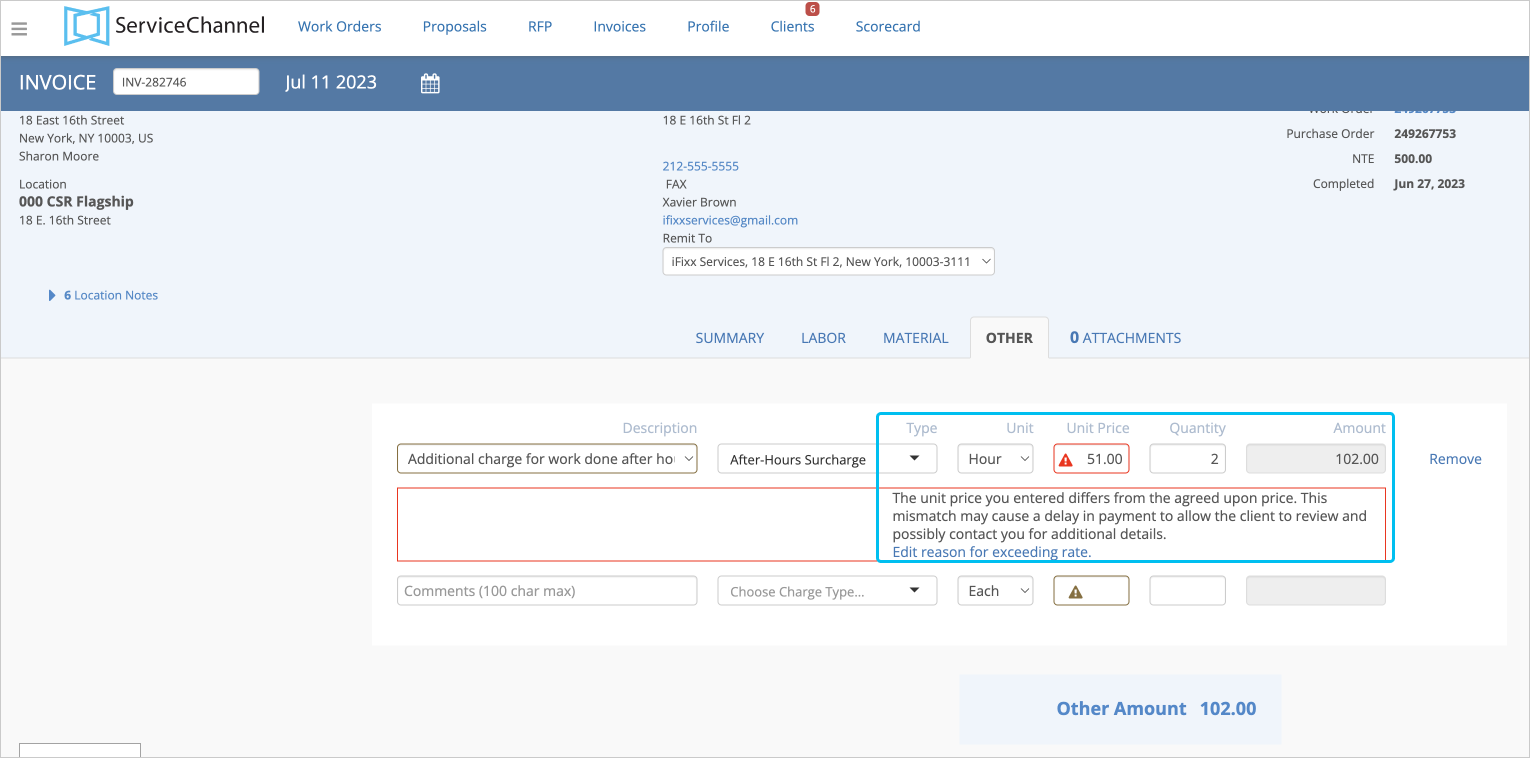
We recommend using price lists to save your and your clients’ time on invoice completion and price mismatch discussions. Contact your ServiceChannel manager to enable price lists. |
- Category from the Description drop-down list
- Charge amount
- To add another line item, click + Another Charge, and repeat the previous step.

|
- Switch to the Summary tab, and enter the tax amount or tax percentage under the invoice subtotal.
- Review the provided charges, tax, and invoice total. If the invoice information is correct, click Send Invoice at the bottom of the page.
Your line item invoice is submitted to your client, and you get to the Invoices List.
|
Adding Attachments to Invoices
After an invoice is created, you can add attachments to it.
| Panel |
|---|
| bgColor | #F9F9F9 |
|---|
| titleColor | #0e3367 |
|---|
| titleBGColor | #EAEAEA |
|---|
| borderStyle | none |
|---|
| title | ⦿ How to Add Attachments to Invoices |
|---|
|
- In the middle of the invoice summary page, click the Attachments tab. The list of current attachments appears.
- Click Upload File. The Upload Attachment overlay appears.
- Click Browse a file and select the applicable file.
- Enter a description of the attachment.
- Click Upload. The attachment is added to the list.
|
| Tip |
|---|
You can attach your original invoice. Contact your ServiceChannel manager to mark attachments as digital invoice copies. 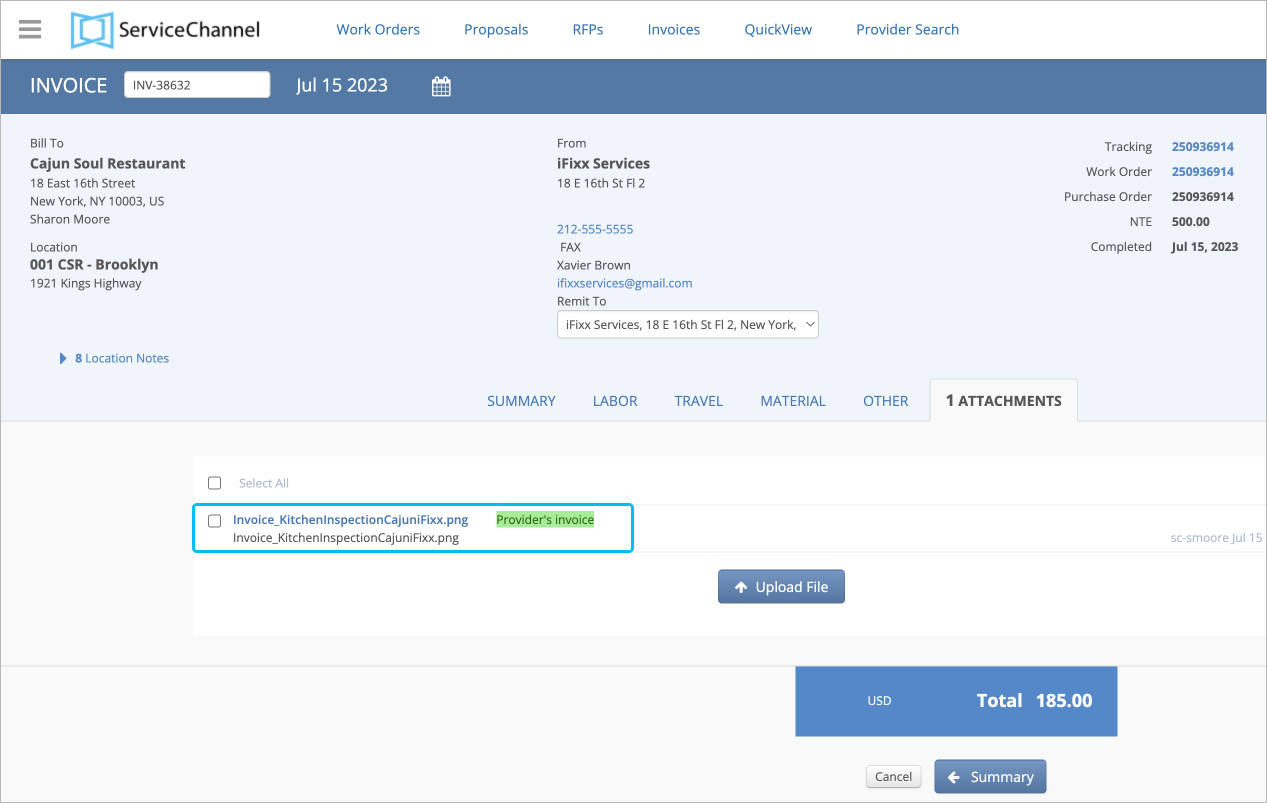
|






